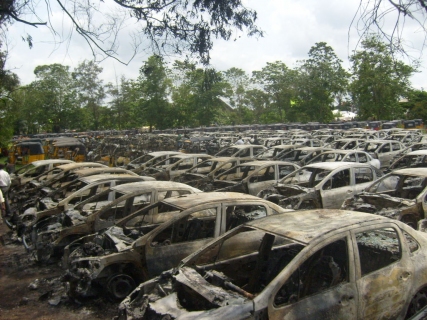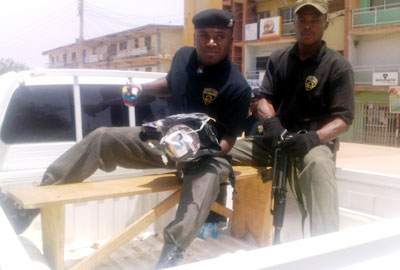President Goodluck Jonathan
By Imam Imam in Lagos, Ike Abonyi and Ezigbo Onyebuchi in Abuja
There were expectedly mixed reactions to the results of the
THISDAY/Ipsos poll on the 2011 general election published in the
newspaper on Monday which indicated that President Goodluck Jonathan
would win the presidential election by 60.3 per cent, while the ruling
Peoples Democratic Party (PDP) may lose the governorship in five states.
While the presidential candidate of the Action Congress of Nigeria
(ACN) faulted the results, the governorship candidate of ACN in Benue
State, Professor Steve Ugbah, and that of the All Progressives Grand
Alliance (APGA) in Imo State, Chief Rochas Okorocha, described the
poll as a true reflection of the facts on the ground.
However, THISDAY legal advisers said Tuesday that while anyone was free
to make comments and disagree with the results as published, any claim
of impropriety would be robustly challenged in a court of law.
Meanwhile, Ipsos, the internationally renowned polling firm that
conducted the poll, Tuesday explained in detail the facts behind the
figures and how the polling was conducted using 11,100 samples in the
36 states of the federation and the Federal Capital Territory (FCT).
This represents the most comprehensive election polling in Nigeria’s
history. Ribadu, in a statement issued on his behalf by Ibrahim Modibbo,
the Director of Media and Publicity of his campaign organisation, said
they were baffled at how the figures were arrived at and accused both
THISDAY and Ipsos of playing to the gallery.
The campaign organisation said it expected the pollsters "to respect
the sanctity of the country and not betray the Nigerian people by
spreading falsehood”. It also questioned the state-by-state result of
the poll, saying "they were not only false and unscientific, but
illogical and cooked up".
According to the poll, Ribadu will win Ekiti State and score 4.7 per
cent of the vote cast. Presidential candidate of the CPC Muhammadu
Buhari said the opinion was not in sync with the reality of what is
happening in the country
at the moment.
Similarly, the presidential candidate of the All Nigeria Peoples Party
(ANPP) and Kano State Governor, Malam Ibrahim Shekarau, described the
poll result as “incorrect” and not a true reflection of the present
political situation in Nigeria.
Spokesman for Buhari-Bakare Campaign Organi-sation, Mr. Yinka Odumakin,
told THISDAY Tuesday that the pollsters "may have sat down on their
computers and came up with figures that are not true representation of
the situation" on ground.
"Let the pollsters go round the country and see the true situation of
things. The Buhari-Bakare ticket is the most widely accepted ticket in
the country at the moment. We believe the poll result was unfair and
not a true reflection of the views of the people of the country," he
said.
He added: "If President Goodluck Jonathan and the PDP think they will
derive any advantage from this poll, then they are deceiving themselves.
The CPC does not attach any importance to the polls because we believe
it was doctored to serve a particular interest." Shekarau's Special
Adviser on Media and Publicity, Sule Ya'u Sule,
said the last few days had shown that the ANPP candidate is the most accepted of all the other candidates in Nigeria.
According to him, the result of the poll would not in any way affect their chances at the elections.
Similarly, Benue State Governor Gabriel Suswam disputed the figures of
the opinion poll which said Ugbah might win the state in the
gubernatorial poll with 72 per cent, while Suswam might score 19 per
cent.
Speaking through his Special Adviser on Media and Publicity, Dr. Cletus
Akwaya, Suswam said the reality of the political situation in Benue
State at the moment was that the governor is the candidate to beat in
the forthcoming elections.
He said if elections were to hold today, the PDP would take 80 per cent of the votes in a free and fair contest.
Also Tuesday, the gubernatorial candidate of the Democratic Peoples
Party (DPP) in Kwara State Gbenga Olawepo said it rejected the outcome
of the Ipsos/THISDAY poll which showed that only one per cent of those
polled say they would elect him as their governor come April.
In a statement signed by the Director of Media and Publicity of Olawepo
Campaign Organisation, Oluwasegun Abifarin, it described the result as
part of an "orchestrated overt and covert campaigns to undermine the
popularity of DPP" in Kwara State.
It said the "plot started in February with a spurious claim that the
DPP did not meet INEC’s deadline for the submission of its candidates’
list. It took the clarification and the publication of the list by the
electoral body for the fire to be extinguished”.
However, Ugba told THISDAY yesterday that the poll result as published
in THISDAY reflected the true wish of the people of Benue. He said the
result of the poll would be confirmed during the gubernatorial election.
Also Tuesday, Okorocha commended Ipsos and THISDAY for the diligent and
scientific manner in which they conducted the presidential and
gubernatorial polls.
THISDAY and Ipsos explained its processes and procedures in a statement
yesterday. The statement reads: “Ipsos initially conducted a
face-to-face survey of 11,100 Nigerians. Interviews were conducted
in-home by trained interviewers between 25 January 2011 and 8 February
2011. The first poll, covered in this press release, covered a range
social and political issues.
“The survey comprised only registered voters and those planning to
register to vote in time for the elections in April 2011. Respondents
were therefore asked at the beginning of the interview if they have
registered to vote in the elections in April 2011. Over nine in ten
(92%) indicated they were registered to vote, and the remaining 8%
indicated that they were still planning to register to vote and so their
opinions were included in the results. “Ipsos undertook a stratified,
multi-stage probability sampling technique in order to neutralise
potential forms of bias that might affect the accuracy and reliability
of the data collected.
This technique applies random selection methods at every stage of
sampling and ensures that all Nigerian adults of voting age (males,
females, urban and rural dwellers, and all social classes) are given a
known chance of being selected to partake in the polling.
“The survey covered all of Nigeria. Within each region the selection of
sampling locations – a mix of urban, semi-urban and rural – was
generated randomly in order for all locations to be given an equal and
known chance of being selected.At least five, but no more than ten,
interviews were conducted in each primary sampling unit (PSU) to
facilitate spread of interviews and adequate representativeness.
“In total 1,730 sampling points were randomly selected across the
federation. This was done to ensure the most comprehensive coverage of
the population possible.
“Following from the selection of the sampling point, is the selection
of dwelling structures via the ‘Day Code’ which determines the actual
interviewing starting point. The date of the interviewing day was
considered for the ‘day code’. E.g. If the day’s date was 9 the first
house to be contacted was house number 9; in the same vein, if the day’s
date was 29, the first place of contact was house number 2.
This was calculated as follows: 2 + 9 = 11 and 1 + 1 = 2.
“The random route walk method with a fixed sampling interval was used.
The sampling interval was fixed. A sampling gap of 1:3 was used in both
medium and low density areas while a 1:5 sampling gap was observed in
high density areas.
“Households were selected through the standard random route walk
pattern, which is the systematic procedure by which an interviewer
selects respondents in the field. The field supervisor in charge ofm
four interviewers allocates different streets to each of them, showing
them in which direction to walk i.e. whether the right or the left sides
of the street should be kept to.
After the supervisor allocates each interviewer a different random
route walk he then chooses to accompany and monitor each of the
interviewers. “To select a person within a household, all the adults,
males or females (depending on the gender to interview) aged 18 years
and above, were listed by name on the respondents selection grid table,
otherwise known as the ‘Kish Grid’ (a table of randomly generated
numbers).The listing was done from the oldest to the youngest eligible
persons and one household member was selected.
“Interviews were conducted face-to-face in all 36 states of the
federation and the FCT (Abuja). This approach ensured that people who
do not own or have access to a telephone were given an equal chance of
being selected. Regionally and locally based interviewers were used to
carry out the interviews (meaning these interviewers will be more
familiar with the local region and languages), and interviews were
always conducted in the respondent’s preferred language (English,
Pidgin, Igbo, Yoruba or Hausa) to ensure congruence with language and
ethnicity of the respondents.
“All interviewers went through a two-day training program to ensure
consistent administration of the questionnaire across the sample, a
practice which is in line with internationally recognized research standards.
“The data were weighted using 2006 census figures to ensure a match
between the survey sample and the Nigerian population. “Fieldwork for
the second poll was conducted between 25 February to 16 March 2011 via a
mix of face-to-face in-home and telephonic re-contact
interviews of the initial sample of 11,100 interviewees. Where
respondents could not be re-contacted they were substituted by a face
to face interview with a respondent who was matched in terms of age,gender, SEC, education level and area.
“All sample surveys are subject to statistical error, depending on
sample size, interviewing methodology and response rate. The margin of
error for the national figures in this poll is 0.93. This means that
range when looking at the national results. The margin of error for
state level figures is +/- 6.3%. “Ipsos fully adheres to the ICC-ESOMAR
International Code of Marketing
and Social Research.
“Ipsos has successfully used identical face to face polling
methodologies in the following developing markets; Mexico, Brazil,
Bolivia, Venezuela, Argentina, Colombia & South Africa. “Electoral
telephonic polling has successfully been conducted in the aforementioned
developing markets as well as in the US, UK, Canada, Australia, Italy,
Spain, Japan, Serbia and France.
“This is the first time such a comprehensive polling exercise has been
conducted in Nigeria both in terms of the vast number of Nigerians
whose opinion was asked, as well as the global expertise that was used
throughout the full process. I.e. polling experts from Ipsos MORI (UK),
Ipsos US, Ipsos Markinor South Africa, Ipsos Brazil, Ipsos Canada and
Ipsos Nigeria were involved throughout this study










 SS Lounge
SS Lounge Protea Hotel Asokoro
Protea Hotel Asokoro




